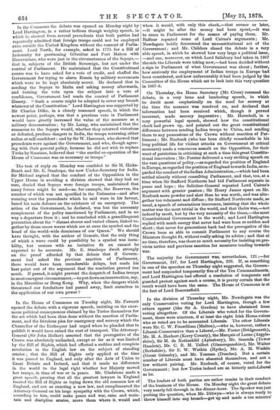The task of reply on Monday was confided to Sir
M. Hicks- Beach and Mr. E. Stanhope, the new Under-Secretary for India. Sir Michael argued that the conduct of the Opposition in the Upper House in avoiding a division showed that they had no case, denied that Sepoys were foreign troops, maintained that many forces might be used—as, for example, the Reserves, the number of which was not specified in the Estimates—and after running over the precedents which he said were in his favour, based his main defence on the existence of an emergency. The action of the Government, he declared, was but the necessary complement of the policy sanctioned by Parliament, and in no way a departure from it ; and he concluded with a grandiloquent peroration about the " distant shores and varied climes, linked to. gether by those ocean waves which are at once the symbol and the bond of the world-wide dominions of our Queen." We should have thought, with the author of Genesis, that the only thing of which a wave could by possibility be a symbol was insta- bility, but orators with an imitative fit on cannot be expected to be accurate. Mr. E. Stanhope dwelt strongly on the proof afforded by that debate that if Govern- ment had asked the previous sanction of Parliament, there would have been unendurable delays, but made his best point out of the argument that the resolution proved too much. If passed, it might prevent the despatch of Indian troops in most emergent circumstances ,—to put down an insurrection, say, in the Mauritius or Hong Kong. Why, when the dangers which threatened our forefathers had passed away, limit ourselves in the application of our own power ?


































 Previous page
Previous page